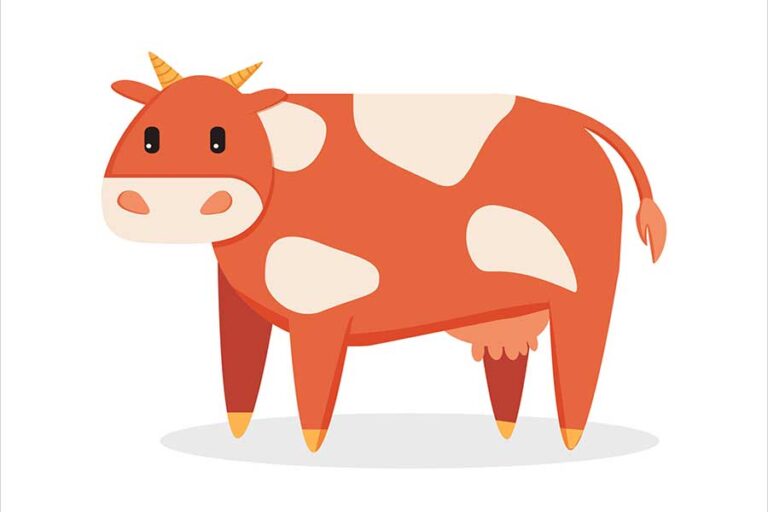Enter a time machine, backward or forward (be”H soon!):
âThe available ashes of the Parah Adumah are dwindling,â said the Kohen Gadol. âPeople will be coming for Pesach to the Beis HaMikdash, and there might not be enough ashes to mix into the water and sprinkle on all of them, to purify them from defilement by contact with the deceased.â
âWe will send out emissaries to locate and purchase a Parah Adumah,â concurred the Temple treasurer.
The emissaries, accompanied by Rabbi Dayan, went from ranch to ranch, checking all the auburn cows (the Parah Adumah was reddish-brown). However, almost invariably, upon careful inspection, they found two black hairs, which disqualified the cow from being used as a Parah Adumah.
Finally, in Mr. Braunâs ranch, they found an auburn cow, without black hairs.
âWeâd like to buy this cow,â the emissaries said. âHow much does it cost?â
âI sell my cows mostly by the pound. Cows generally run about $1,500 apiece,â Mr. Braun replied. âI must say â Iâve never had any buyer check an animal so thoroughly!â
âI have to share something with you,â Rabbi Dayan said. âWe are seeking a Parah Adumah, which will be slaughtered on Har Hazeisim to make ashes to purify people coming to the Beis HaMikdash. This is not a regular cow for milk or breeding. Itâs worth more than a regular cow.â
âThen Iâll sell it for $10,000!â said Mr. Braun.
âDeal!â said the emissaries.
After they left, Rabbi Dayan said, âMr. Braun could have asked for $20,000 or even $50,000, and you would have paid. You got a good deal!â
âWhy did you say anything?!â asked the emissaries. âHad you not told him itâs for use as a Parah Adumah, we could have bought it for $1,500, like any other cow!â
âThere must be a reason,â said one emissary. âLet Rabbi Dayan explain.â
âWhy did you alert Mr. Braun that the cow was a Parah Adumah?â
âRare items, such as a Parah Adumah, do not have a definable âfair market value,ââ replied Rabbi Dayan. âTherefore, according to many authorities, there is no onaâah (unfair pricing) claim (Hilchos Mishpat 227:29[28]).
âNonetheless, clearly a Parah Adumah is worth much more than a regular cow, so paying the cost of a regular cow is deceitful.
Moreover, some maintain that because of the itemâs special status, it is considered a different item from a regular cow. Thus, if Mr. Braun was unaware of the special character of his cow, it is considered a mekach taâus â a mistaken sale, like one who intended to sell a cow and sold a deer. Or, at least, like one who stipulated to sell low-grade wheat and mistakenly sold high-quality wheat, in which case the seller can retract (C.M. 233:1; Pischei Choshen, Onaâah 10:13[25]).
Thus, if I hadnât alerted Mr. Braun that his cow is not a regular one but rather has special value, there could be geneivas daas, and, moreover, he could possibly even raise a claim to void the sale!
A similar situation can arise in day-to-day commerce regarding collectorâs items, such as a stamp dealer who buys stamps from someone and notices that there is a rare mistake in a stamp so that it has great value.
According to this opinion, the dealer may not feign that he is buying a regular stamp for the standard price but must alert the seller to the fact that the stamp is irregular and worth more.
Nonetheless, the dealer does not have to tell him the full value of the rare stamp, but it suffices to say that this stamp is irregular and worth more than usual. This is because there is no clear value so that onaâah does not apply, and once the dealer alerts the seller it is no longer geneivas daas or like buying a different quality item. (Of course, the dealer may not mislead the seller and falsely say that it is worth less than he evaluates it but can offer what he wants.)
âFurthermore,â concluded Rabbi Dayan, âif the dealer bought a collection without evaluating the value of each and every stamp but rather priced the entire lot, the rare stamp is included and the seller would have no claimâ (C.M. 227:28).
Verdict: If a buyer realizes that an item has exceptional qualities granting it hidden, higher than usual value, and the seller sells it unaware, there is potential geneivas daas and even concern of mekach taâus.
Regenerate means to restore or renew something to its original or better condition. It can also refer to the process of growth or renewal, especially in biology or ecology.
Source link


